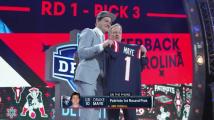Should the ‘sit-out year’ return to NCAA transfer rules? | College Football Enquirer
Yahoo Sports’ Dan Wetzel and Sports Illustrated’s Pat Forde discuss the chaos of the transfer portal in college basketball and football, and debate if the rule that required transferring athletes to sit out a year should return to help curb that chaos.
Video Transcript
DAN WETZEL: 13 months ago, they passed a rule saying the one-time transfer portal. One time, you join up, you can enter the portal and play, no penalty. In the past, you had to sit out one season. You would still get tuition, room, board, medical, training. You could practice with the team, tutoring, all the different things. You could collect Pell Grant money. You could get your stipend. So these kids are at the school, coming out plus, cash positive, right?
PAT FORDE: Yep.
DAN WETZEL: I mean, you can make 30, 40 grand at some of these schools being a college athlete right now.
PAT FORDE: Yes.
DAN WETZEL: That has created the free agency that I think is at least a more fair concern amongst players. And as a general sport, if you're trying to manage yourself, you don't want to see too much player movement. You don't want to see Pitt just get raided every year if they have a good player.
PAT FORDE: Yeah.
DAN WETZEL: So the thing that they should have never gotten rid of the one year sit out. They should have just kept-- if you want to transfer. I don't think it is punitive. I don't think it is mean spirited. I don't think it is unfair if you give a kid a extra year of college and all that goes with it. I think that's a way.
Now the problem with the transfers historically is-- and this is, of course, what happens-- the coaches that are complaining abuse the hell out of the system.
PAT FORDE: Of course.
DAN WETZEL: And the reason we have a transfer portal is because coaches used to be able to block where you wanted to go. 2018, backup QB Evan Shirreffs of Miami, Miami blocked 18 schools.
PAT FORDE: Whoo!
DAN WETZEL: 2009, Robert Marve, another quarterback from Miami, 27 schools they blocked.
PAT FORDE: Wow.
DAN WETZEL: 2010, Wes Lunt, Oklahoma State, banned from 38 schools.
PAT FORDE: Wow.
DAN WETZEL: So the coaches and the administrators and the conference officials who oversaw all this sat there and allowed college football to be completely outrageous, vindictive, mean, show no concern for a player or his family. Totally absurd. Pigs get fat, hogs get slaughtered.
PAT FORDE: Yeah. The adults screw this up for the players, for the athletes, because they are trying to get some insane advantage, whatever it may be, or just to be punitive and vindictive. But if you go back-- and I understand your point about the one-year residency transfer thing not being a bad thing. But it was completely inconsistent, because in almost every sport in college athletics, you could transfer right away.
DAN WETZEL: Exactly.
PAT FORDE: But not football and basketball because it was too much, too vicious, and the backbiting and the infighting was too much. And so they raised such a stink that that's why they initiated the rule for the year.
DAN WETZEL: Football, men's and women's basketball, and men's and women's hockey. And that's why you lost all of your goodwill and why you're on your heels. Because for decades, you guys did this. And it's the same damn people.
PAT FORDE: Right. Rules that are to benefit the people in power and to completely disempower or unempower the athletes. That's what the whole thing has always been about, and it was all a competitive thing. And we're mad at that school, so no, that, all of a sudden, we have to have a rule where you have to sit out and then we can tell you which schools you can't go to, which was always terrible.
The other part of that, though, then is, OK, waiver mania came in like 2017, '18, '19. And all of a sudden, everybody needs a waiver, because everybody's grandma is sick and I need to be closer to grandma.
DAN WETZEL: Oh, no. You had a story-- does grandma really got cancer? Can we-- then you got people going, can I see the medical records?
PAT FORDE: Right.
DAN WETZEL: Right. So there were both too-- so they were too hard and mean, then they got too soft.
PAT FORDE: Yep.
DAN WETZEL: And so to me, the way out of a lot of this, allow a player to transfer anywhere they want. There are no restrictions allowed, because that sucks. But at the same time, you say, you got to sit out a year, all of you. I don't care if you're the lowest member of the cricket team or whatever they got up at Stanford. Everyone's got to sit out one year of competition. Deal with it. OK?
They have that in high schools.
PAT FORDE: Yeah. Yeah.
DAN WETZEL: All right? Now, will you get sued? Are you standing in the way of someone's ability to work? I don't know. Because you can still say they can get paid by the collective and you still give them all their money, but if you do that, give them all their stipends and all the money that they have coming to them, I don't know. So really good sophomores and juniors aren't going anywhere. Even if you're a freshman and you want to transfer, a collective is going to essentially have to pay twice as much for a player, because you're going to pay a kid to sit.
I think you take a tremendous amount of heat if you could go back 13 months and not establish that thing. Now again, now you're going to have to take something away, which you probably lose in court. But if you're trying to draw a line in the sand, that's where I would go.







